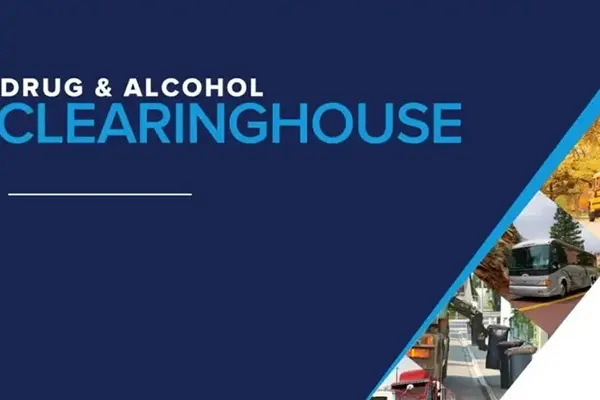
Drug & Alcohol Clearinghouse: What you Need to Know for CDL Training
In January, the Federal Motor Carrier Safety Administration’s (FMCSA) Commercial Driver’s License Drug and Alcohol Clearinghouse took effect. For those of you looking to get into the field of truck driving, we will attempt to summarize what it all means.
For starters, the Clearinghouse was designed to identify drivers who fail an alcohol or drug test while employed by a carrier, or are looking to obtain a CDL. In the past, a driver could relocate to another state, or move to another unsuspecting carrier, before their record caught up with them.
The Omnibus Transportation Employee Testing Act of 1991 requires certain transportation drivers to undergo drug and alcohol testing by the United States Department of Transportation. However, its guidelines only mandate background checks of potential employees for drug and alcohol violations for a three-year period.
The FMCSA Drug and Alcohol Clearinghouse (DAC) is a database of D.O.T. administered drug and/or alcohol test results. It contains all violations that occur on or after January 6, 2020 and includes results with a BAC over .04, positive drug test results and refusals to test. These violations stay in the database for a five-year period or until the driver completes the return-to-duty process, whichever is later.
Why is FMCSA implementing these strict measures? Simply put, for safety reasons. Commercial drivers are tasked with heavy loads in large vehicles that need to be delivered in a timely manner. Obviously, being under the influence of drugs or alcohol affects driving skills. Alcohol impacts your reaction time, your coordination, concentration, vision, and overall judgment. Driving under the influence of alcohol is responsible for approximately 30 deaths every day in the US.
Likewise, drugs cause impairment in a variety of ways, depending on the drug. The National Institute on Drug Abuse notes that opioid use, for example, doubles the risk of having a crash. Clearly this is a concern for the industry, and the public at large.
So, what does all this mean for a new student?
SAGE Students must register with the DAC as soon as they have their CDL Permit. Students will be required to give electronic consent through the Clearinghouse website in order for SAGE to do a full query of a student’s DAC record. You may not operate a truck in training on public roads until the DAC consent and query is complete and you’ve been approved. Keep in mind, if you decide to stay in the trucking industry, DAC inquiries will be a routine part of the hiring process.
The registration is not overwhelming, or complicated, and can be accomplished fairly quickly during the enrollment process at SAGE. You simply need a valid email address to confirm your registration. Providing you have that, we can help you with the rest.
Once you are registered, your information is stored in the Clearinghouse by your date of birth and (eventually) your CDL number. Any time data on you is added or changed in it, you’ll be notified by mail or through electronic notification. The Clearinghouse website contains numerous resources for drivers, including FAQs about the FMCSA program and a detailed brochure. You can find links, and more info about that on our website at https://sageschools.com/clearinghouse
What happens if a student or driver fails a drug or alcohol test?
If a driver or student fails a drug or alcohol test, their violation is recorded in the Drug and Alcohol Clearinghouse. To regain eligibility to drive, they must complete the Return-to-Duty (RTD) process, which includes:
- Evaluation by a Substance Abuse Professional (SAP) who determines a treatment or education plan.
- Completion of the required treatment or education program.
- A follow-up drug/alcohol test with a negative result.
- Follow-up testing for a period of time (at least six tests in the first 12 months).
Until the RTD process is completed, the driver is prohibited from operating a commercial vehicle.
Are there any costs associated with registering in the Clearinghouse?
Registering in the FMCSA Clearinghouse is free for drivers. However, employers (such as trucking companies or CDL training schools) must pay a fee to conduct full queries on drivers. Some third-party services may charge fees for assistance with the registration process. If a driver needs to complete the Return-to-Duty process after a violation, they may also incur costs for evaluations, treatment programs, and follow-up testing.
How does the Clearinghouse impact current CDL holders versus new students?
- New students must register with the Clearinghouse as soon as they obtain their CDL permit and consent to a full query before starting training.
- Current CDL holders are already in the system and are subject to mandatory pre-employment, random, and post-accident drug and alcohol testing. Employers must conduct annual limited queries on all CDL drivers to check for any new violations. If a driver has a violation recorded, they cannot drive until they complete the Return-to-Duty process.
In both cases, any new violations will be recorded in the database and remain there for five years (or until RTD completion).
Note: Marijuana is illegal in the trucking industry, even though it is legal in some states. Use of marijuana can be detected in a urine test, for over 30 days. Alcohol can show up in a blood test for up to 12 hours or be detected in urine for up to 3-5 days. The effects of opioids may only last for several hours, but the urine tests can detect cocaine for up to two days and heroin up to seven days after the last use. Don’t let substance be the reason your future career in trucking ends before it even begins.
Disclaimer: The information in this article is based on the data available as of its writing and is meant to inform and guide prospective CDL trainees. For the most current information and specifics about CDL training programs, please contact SAGE Truck Driving Schools directly.
Please fill out the information below and our team will reach out to chat about your options.


